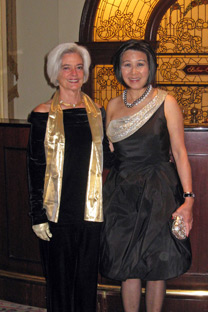Alumna's passion for disability advocacy will allow ILR institute to 'dream big'
Lisa Yang '74 likes this quote from Harvard University psychology professor Ellen Langer: "Any disability may function as an ability if we view it from a new perspective."

ILR's Susanne Bruyère, left, joined Lisa Yang '74 when Yang was awarded the Cheryl and Howard Hassman Leadership Award at the 11th Annual Devereux Pennsylvania Gala in 2009. Devereux is a nonprofit behavioral health organization that operates a national network of clinical, therapeutic, educational and employment programs and services.
When it comes to people with disabilities and the working world, Yang has a strong message for corporate America, too. "Companies can do more to hire people with disabilities, educate others in the workplace, and to maximize the use of people with disabilities at work," she says.
A former Wall Street executive, Yang has a passion for making disability issues visible, and for ensuring that young people with disabilities get the training they need to transition to the world of work. For Yang, constantly staying innovative and implementing effective adaptive techniques in the workplace for people with mental and physical disabilities is not just politically correct, it's critical.
This passion, and her commitment to making the corporate world much more disability-friendly, inspired her to make a major gift to the ILR School's Employment and Disability Institute.
"The workplace forms such a big component of our lives. It's not only a place where we validate our economic existence, but also a place where we develop social and recreational ties and perhaps even personal relationships," she says. "It's important that companies foster a culture that enables people with disabilities to flourish as well as be accepted for who they are."
In 2008, Yang met Susanne Bruyère of ILR, and they immediately hit it off. Issues of common interest included providing appropriate accommodation in the workplace as well as educating businesses to prevent workplace discrimination.
"I have tremendous respect for Susanne and would like to help her and her team execute their vision for EDI," Yang says.
Bruyère, EDI's director and ILR's associate dean of outreach, says engaging with Yang over the past three years has given EDI the chance to "dream big." "Lisa is helping us to fund innovative ventures that otherwise wouldn't be possible. We can expand EDI's reach and ultimately maintain ILR's strength in providing long-term global leadership on disability issues."
Like Yang, Bruyère says there is a need for companies to change hiring and retention practices for people with disabilities, and to integrate disability into their diversity agendas. She adds that businesses also need to make disability a bigger part of their social responsibility efforts and a key philanthropic focus "if we are ever really going to make a difference."
A personal interest
Before meeting Bruyère, Yang was no stranger to disability. In fact, it hit very close to home. In the early 1990s, Yang's younger son was diagnosed with autism. Because he frequently required emergency care, she relocated to the U.S. from Singapore.
Yang moved to be near The Children's Hospital of Philadelphia, considered by many to be the best for treating children with autism. Her daughter was diagnosed with high-functioning autism and is enrolled in college while working part time. Another son works in investment banking in California.
"I'd like to see the world accept people with disabilities. In fact, there is so much talent and productivity that is being overlooked when you realize that the definition of disabilities is not confined to a condition from birth, but could be a result of physical and mental trauma arising from an accident or even from active duty service members in conflict," she says.
Having a disability institute at ILR, Yang says, speaks well for Cornell's culture of diversity and how the university takes seriously the extension of diversity into the workplace to help people reach their potential.
She also has high praise for ILR. An ILRie herself, she came to the school on a referral from a Cornell sociology professor she met while working as a research assistant at the University of Singapore. From a young age, she thought medicine might be the right career path, but she developed an interest in industrial psychology and landed at ILR.
Retired since 2001, Yang devotes much of her energy to disability and mental health advocacy. She serves on the board of the Devereux Foundation, one of the nation's leading mental health organizations.
Yang is working with a college in the Philadelphia area to develop an associate's degree program for people interested in the mental health field who want to work directly with the autistic population in the workplace as well as in day programs and residential settings.
She would like to see her gift to EDI put a spotlight on disability issues in the workplace and lead to more partnerships in the corporate world that help create enlightened workplaces and "tremendously equalize the playing field for people with disabilities."
EDI, Yang believes, can have impact much like the Special Olympics, which "changed generations of young people and made them much more open to people with differences," she says.
"The work that Susanne and EDI are doing -- that can help us change the world, one person and one company at a time."
Related links:
ILR School's Employment and Disability Institute